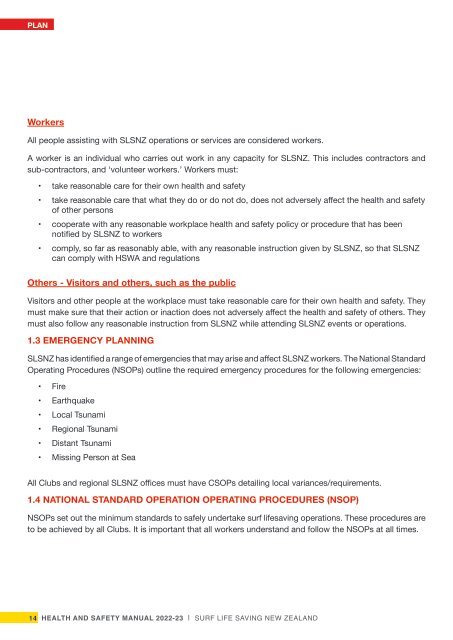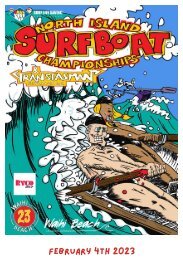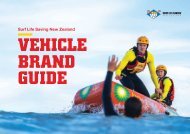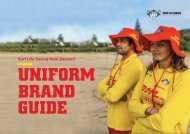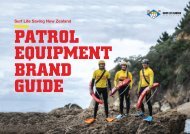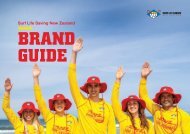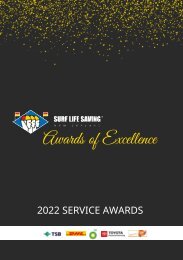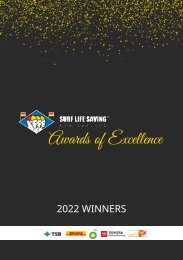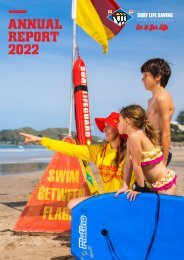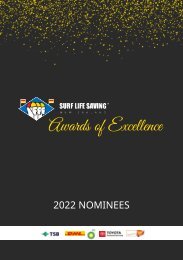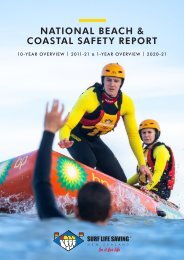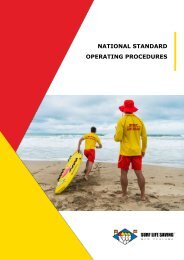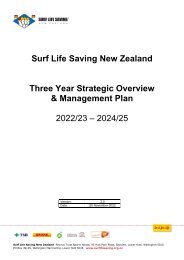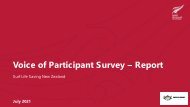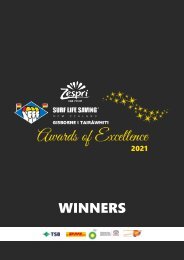SLSNZ Health and Safety Manual
Create successful ePaper yourself
Turn your PDF publications into a flip-book with our unique Google optimized e-Paper software.
PLAN<br />
PLAN<br />
Workers<br />
All people assisting with <strong>SLSNZ</strong> operations or services are considered workers.<br />
A worker is an individual who carries out work in any capacity for <strong>SLSNZ</strong>. This includes contractors <strong>and</strong><br />
sub-contractors, <strong>and</strong> ‘volunteer workers.’ Workers must:<br />
• take reasonable care for their own health <strong>and</strong> safety<br />
• take reasonable care that what they do or do not do, does not adversely affect the health <strong>and</strong> safety<br />
of other persons<br />
• cooperate with any reasonable workplace health <strong>and</strong> safety policy or procedure that has been<br />
notified by <strong>SLSNZ</strong> to workers<br />
• comply, so far as reasonably able, with any reasonable instruction given by <strong>SLSNZ</strong>, so that <strong>SLSNZ</strong><br />
can comply with HSWA <strong>and</strong> regulations<br />
1.5 CLUB/SERVICE OPERATING PROCEDURES (CSOP)<br />
CSOPs provide important Club/Service specific information <strong>and</strong> procedures that are unique to the Club or<br />
location, environment <strong>and</strong> scope of operations. CSOPs are an extension of the NSOPs <strong>and</strong> detail further<br />
localised procedural information set out by the Club or Service. Every lifeguard, member or volunteer<br />
undertaking Club duties, e.g., driving an ATV or filling a fuel bladder, must be familiar with the content of the<br />
relevant NSOP <strong>and</strong> CSOP for the duty they are undertaking. Check with your Club to confirm where their<br />
CSOPs can be found.<br />
Others - Visitors <strong>and</strong> others, such as the public<br />
Visitors <strong>and</strong> other people at the workplace must take reasonable care for their own health <strong>and</strong> safety. They<br />
must make sure that their action or inaction does not adversely affect the health <strong>and</strong> safety of others. They<br />
must also follow any reasonable instruction from <strong>SLSNZ</strong> while attending <strong>SLSNZ</strong> events or operations.<br />
1.3 EMERGENCY PLANNING<br />
<strong>SLSNZ</strong> has identified a range of emergencies that may arise <strong>and</strong> affect <strong>SLSNZ</strong> workers. The National St<strong>and</strong>ard<br />
Operating Procedures (NSOPs) outline the required emergency procedures for the following emergencies:<br />
• Fire<br />
• Earthquake<br />
• Local Tsunami<br />
• Regional Tsunami<br />
• Distant Tsunami<br />
• Missing Person at Sea<br />
All Clubs <strong>and</strong> regional <strong>SLSNZ</strong> offices must have CSOPs detailing local variances/requirements.<br />
1.4 NATIONAL STANDARD OPERATION OPERATING PROCEDURES (NSOP)<br />
NSOPs set out the minimum st<strong>and</strong>ards to safely undertake surf lifesaving operations. These procedures are<br />
to be achieved by all Clubs. It is important that all workers underst<strong>and</strong> <strong>and</strong> follow the NSOPs at all times.<br />
14 HEALTH AND SAFETY MANUAL 2022-23 | SURF LIFE SAVING NEW ZEALAND<br />
SURF LIFE SAVING NEW ZEALAND | HEALTH AND SAFETY MANUAL 2022-23<br />
15


